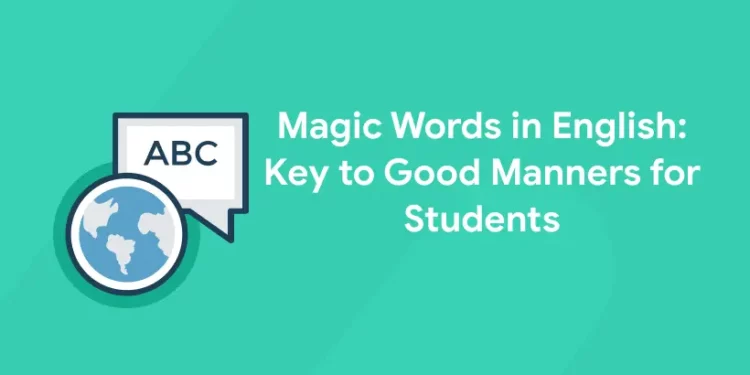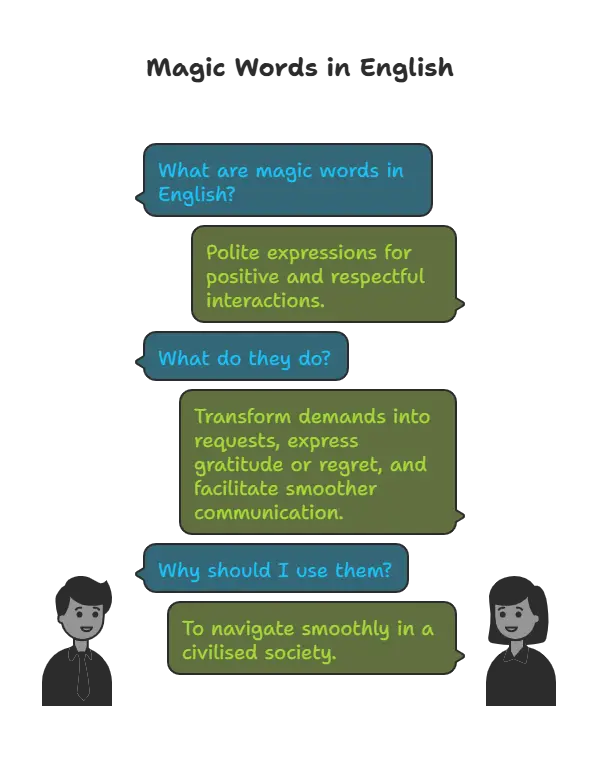Table of Contents
Good manners form the foundation of positive interactions and conversations. It is important to understand positive conversation skills for young students who are in the process of learning to navigate the world around them. Using the right word can make huge differences in every setting, whether it is in a home, a classroom or a playground. This is where magic words come into play. These are simple phrases that carry the power to build trust, show appreciation, and foster kindness. In the modern world, teaching kids to use these words is not just about being polite. It is one of the best ways in which you can shape responsible and empathetic individuals. In this blog, we will discuss the magic words in the English language in detail.
Get the best teachers to learn spoken English! Join the Entri spoken English course!
Magic Words in English: Introduction
Magic words in English are short expressions that are used to make a conversation more polite. This includes words like thank you, sorry, etc. These words are really important and have a powerful impact on conversations. Using these words while speaking shows that you have respect, kindness, and social awareness. Students benefit greatly from learning and using these expressions. They can enhance relationships, boost confidence and help you create the impression of having a good character.
What Are Magic Words in English?
1: Which of the sentences below is grammatically correct?
Magic words in English are polite expressions that are used to make interactions positive and respectful. They play multiple roles in a conversation. Some of them are:
- Transform demands into requests
- Express gratitude or regret
- Facilitate smoother communication
It is important to learn and use these words if you want to navigate smoothly in a civilized society.
Spoken English Course for Guaranteed Confidence and Career Growth
Spoken English Course by Entri App: Enhance your communication skills, gain certification, and boost your career with confidence.
Join Now!List of Common Magic Words in English
The magic words in the English language are listed below.
| Magic Word/Phrase | Purpose | Example |
| Please | Politely request | “Can I have water, please?” |
| Thank You | Express gratitude | “Thank you for your help.” |
| You’re Welcome | Acknowledge thanks | “You’re welcome—happy to help.” |
| Sorry | Apologize | “I’m sorry I was late.” |
| · Excuse Me
· Pardon Me |
To interrupt or correct | “Excuse me, may I ask a question?” |
| · May I
· Would You Mind |
Seek permission | “May I go to the library?” |
| · Congratulations
· Well Done |
Praise | “Well done on your project!” |
| Bless You | After a sneeze | “Bless you |
| · How Are You?
· Take Care · All the Best |
· Greetings
· Farewells · Goodwill |
“All the best for your exams!” |
Want to ace your next interview but are not confident in speaking English? Join now!
Why Are Magic Words Important for Students?
It is important for a student to learn magic words in the English language for the following reasons.
| Reason | Details |
| Builds Good Manners | · Teaches respect and politeness.
· Encourages courteous behaviour. · Creates a positive classroom environment. · Sets the tone for respectful interactions. · Helps students become role models for others. |
| Improves Communication | · Helps express thoughts clearly.
· Makes requests and apologies appropriate. · Reduces misunderstandings. · Builds confidence in speaking to others. · Teaches the power of words and tone. |
| Fosters Better Relationships | · Builds trust with peers and teachers.
· Shows appreciation and respect. · Helps resolve conflicts kindly. · Boosts teamwork and cooperation. · Fortifies relationships with family and friends. |
| Boosts Emotional Growth | · Teaches empathy and responsibility.
· Boosts self-awareness. · Aids in managing emotions better. · Encourages practising kindness and compassion. · Help in developing and improving emotional resilience through accountability. |
| Prepares for the Real World | · Creates good habits for life.
· Useful in interviews and jobs. · Shows professionalism and respect. · Enhances social confidence. · Makes a strong first impression. |
Learn to speak English correctly from expert teachers! Join the Entri online course now!
Tips to Use Magic Words Daily
Some tips for using magic words in English are discussed in this section.
| Tip | Why It Matters |
| Start with Greetings | · Starts the day on a positive note.
· Builds emotional connection. · Shows friendliness and care for others. |
| Express Gratitude | · Builds appreciation and empathy.
· Makes others feel valued. · Inspires a culture of kindness. |
| Lead with “Please” | · Expresses respect and politeness.
· Makes people more willing to help. · Helps avoid sounding rude or demanding. |
| Be Sincere with “Sorry” | · Repairs trust and shows maturity.
· Builds emotional responsibility. · Imparts accountability and self-awareness. |
| Use “Excuse Me” / “Pardon Me” | · Expresses respect for personal space and time.
· Helps reduce disruptions. · Encourages thoughtful communication. |
| Model “You’re Welcome” | · Reinforces politeness and gratitude.
· Shows kindness in return. · Keeps the cycle of respect going. |
Practice spoken English exercises with expert mentors! Join the Entri online course now!
Spoken English Course for Guaranteed Confidence and Career Growth
Spoken English Course by Entri App: Enhance your communication skills, gain certification, and boost your career with confidence.
Join Now!Some More Tips for Using Magic Words in English
There are some more tips to keep in mind while using these words:
| Tip | Why It Matters | ||
| Visual Reminders | · Reinforces memory through visuals.
· Prompts regular use. · Makes learning fun and engaging. |
||
| Apply to Everyone | · Builds universal respect.
· Demonstrates maturity and fairness. · Encourages inclusion and empathy. |
||
| Lead by Example | · Kids learn by imitating adult behaviour.
· Establishes a respectful tone in the home or classroom. · Encourages one to be consistent and genuine in usage. |
||
| Make It Routine | · Builds lifelong habits.
· Helps magic words become second nature. · Creates a respectful and consistent environment. |
||
Get the best tutors to learn spoken English! Register here to join the Entri online course!
Magic Words in English: Conclusion
From reading all the above sections, we can understand that using magic words during conversation is essential for maintaining politeness and avoiding sounding rude. Magic words in English are a tool to build:
- Respect
- Kindness
- Effective communication
- Good manners
- Character-building
- Successful social interactions
Using these words regularly and correctly can make you a sparkling conversationalist in informal and professional settings.
Spoken English Course for Guaranteed Confidence and Career Growth
Spoken English Course by Entri App: Enhance your communication skills, gain certification, and boost your career with confidence.
Join Now!Frequently Asked Questions
How can teachers or parents teach magic words in English effectively?
Teachers, parents and guardians can teach magic words in English using the following methods.
games
- Songs
- Modelling
- Gentle reminders
- Routines
The best way to teach magic words is by making the teaching methods fun and habitual.
When should magic words in English be used?
Magic words can be and should be used in all settings, including:
- Classroom interactions
- Peer conversations
- Family life
- Public spaces
- During play
- Online
They are universal and should be used as much as possible.
Why should students use magic words in English?
Students are supposed to learn and use magic words in English because they can:
- Foster respect
- Create healthy relationships
- Build robust communication skills
- Improve emotional intelligence
- Show professional readiness
How many magic words are there?
There exist five magic words in English. They are:
- Please
- Thank you
- Sorry
- Excuse me
- You’re welcome
But some variations are also used according to the context. Some examples of this are:
- May I
- Pardon me
- Congratulations
What are magic words in English?
They’re polite words or phrases that are used in everyday conversations. Some examples are:
- Please
- Thank you
- Sorry
- Excuse me
- You’re welcome










